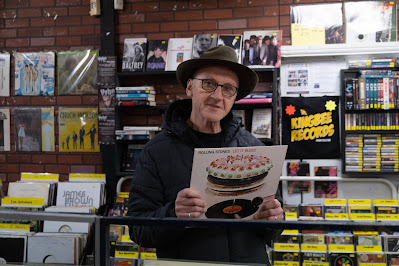In conversation with... Robert Graham
Hi Robert! First of all, I would like to congratulate you on the publication of The Former Boy Wonder! Can you please briefly tell us what it is about?
A: It’s the story of Peter Duffy, a music writer whose life is falling apart. He’s on the cusp of 50, his career has gone down the tube, his marriage is in crisis, and Jack, his teenage son, appears to hate him. Because his work as a high-flying music writer has dried up, he’s been beached at home in Manchester. He used to live what he sees as the high life: touring the world with stadium-filling bands to write features on them for fictionalised versions of magazines like MOJO and UNCUT. While he has been engaged in that, his wife, Lucy, has been getting on with her life and because he's been an absent father, his son is angry with him. That’s the status quo, and then a friend from university days invites him to a party at the manor house where he met his first love, Sanchia Page. All his college friends are going to be there, and although it's a long shot, there’s the very slight change that she will be, too. Nobody has heard from her since they were in their early 20s, but he dreams of her turning up at this party. From that point, the novel breaks into two strands. One focuses on Peter’s life over the three months running up to this party. The other is the story of his first love, the story of Sanchia, which is set in the 80s, and of his troubled relationship with his father, Ray Duffy, which we see from when Peter is 8 through until he’s 25.
Did you have the plot entirely figured out when you started writing the book or did it take an unexpected turn as the characters grew on the page?
A: I’m a gardener, not an architect. I write to discover. With this novel, I knew who the characters were before I began writing and I had an idea where it might start and end. Other than that, I was flying by the seat of my pants. What I’ve learned from the experience is that although I won’t ever be too much of a planner, it helps if before you start you have an idea of structure. After more rejections than you could shake a stick at, I’d say that what ended up getting me over the line with TFBW was studying structure much more than I had done before. The draft I had up to that point had most of the elements of what the novel would in the end become. I just needed a better framework to hang them on. But, as the writer David Gaffney says, you write your novel and then you plan it.
Was The Former Boy Wonder your working title? Either way, how did you choose it?
A: The working title was The Fabulous Girl, because for the first few years of writing TFBW, I thought it was just a novel about mid-life crisis and first love. The Fabulous Girl signified that she was fabulous in two senses: an object of desire and at the same time a fantasy. The title The Former Boy Wonder was one I had in the early 90s. I didn’t have anything else: no fiction to go with the title. It came to me, and I thought it was a good one, but I didn’t do anything with it, and it went out of my head. Years later, in the mid-2010s, I was swimming along in a pool in Bangor, Co Down when the title popped back into my head, and it felt entirely inspired. As I thought about it, The Former Boy Wonder seemed to me to be the perfect title for the book I had written. There was the comic-book angle, which is there in the story, and the idea that Peter as a small boy was Robin the Boy Wonder to his father’s Batman. After his father left the family, that left Peter as the former Boy Wonder. 40 years later, as his own son, Jack, begins to outgrow him, he, Jack is the former boy wonder leaving Peter as the abandoned Batman. In the present day of the novel, Peter’s once successful career as a freelance music writer is going down the toilet. He used to be a boy wonder journalist, but he isn’t anymore. When he was a student, he was for a while a boy wonder to Sanchia Page. Once, he was a wonder boy to Lucy, his wife, too – but no longer. So, looked at from all angles, The Former Boy Wonder was the perfect title for the novel I had written. There’s something strange about this: the title came to me years before I wrote the novel. And then, when I had almost finished, I remembered it and saw how it fitted what I had written. Spooky.
I’m a firm believer in inspiration coming from another dimension – the other side. The story already exists there and it’s the writer’s job to tune into the broadcasts and import it into this dimension. You do this by being aware of when the unconscious mind is in play (as it was in that swimming pool) and being sure to take notes when it broadcasts. In the case of this novel, the broadcast that featured the title just happened to arrive 15 to 20 years before the rest of the novel. But that makes sense: they don’t do time on the other side.
If this novel was going to be turned into a film, who would you cast in the role of Peter?
A: Chris O’Dowd. It’d have to be an Irish actor who could do comedy and drama, who could play clown as well as romantic hero.
Without giving too much away, can you tell us about a scene in the book that you love or that was particularly difficult to write?
A: The one that occurs to me is the party at the start of the strand that’s set in the ‘80s. I had a model in mind – Alain-Fournier’s novel, Le Grand Meaulnes. In it, the hero meets and falls in love with a young woman at a magical party in a chateau. I knew I wanted to emulate that in TFBW. I wanted to create on the page a magical domain where a young man falls in love for the first time. I studied the party and the chateau in Le Grand Meaulnes, and the main party chapter in The Great Gatsby and looked at all the elements within them: lights, costumes, music, a mansion, and an elusive love interest who is kept off stage for as long as possible. In Meaulnes, it’s Yvonne de Galais, the object of desire for Augustin Meaulnes; in Gatsby, Jay Gatsby is the object of desire for Nick Carraway, the narrator. From Fitzgerald’s novel I learned a lot about building mystique for the object of desire. I also studied the way Evelyn Waugh created Brideshead in Brideshead Revisited – the physical details of this minor stately home. Alongside that, I’ve written about the use of setting in two of the Creative Writing handbooks I’ve written or co-written, so I had a variety of theories about how to use setting to – for example – create emotional tone and to characterise and I used at last three models of good practice in writing setting. Alongside that, I studied a few novels where the experience of fist love is featured – most notably Turgenev’s First Love, but also Great Expectations. So the scene – it’s most of a chapter, in fact – I love and that I probably spend the most time on is the one that features the party where Peter meets Sanchia. I can’t say whether or not any readers will admire it, but I put a lot of time and effort into constructing this part of TFBW, and when I look at these pages now, I can see all the elements that derived from studying both theory and good practice.
Is there anything that didn’t make it into the final version of the book?
A: So much you wouldn’t believe it. For example, the career of Peter’s father Ray Duffy. You can find some of it in my novella A Man Walks Into a Kitchen, but it didn’t make it into TFBW – 35,000 words there. Over the years, I’ve cut many scenes from this novel and had at least half a dozen different endings. At one stage, the strand in the present day ended with a car crash. I spent a morning on YouTube studying clips of police and ambulance crews at the scene of an accident and carefully wrote a chapter, which I binned a few months later. I also canned a scene set in David Lloyd and another in John Lewis. Many scenes that did make it to the final cut had hundreds of words lopped off them. And between Holy Joe, my first novel, and this one I wrote two whole novels which are still sitting in a folder on this computer. Apart from salmon laying spawn, I can think of nothing where there is more wastage than in a novelist’s working life – or at least this one’s.
If you are already working on your next writing project, would you mind giving us a little anticipation of what we are to expect?
A: I’ve got a first draft of a novel about a school trip to Paris; most of a first draft about an artist hunting for a painting of his which has been stolen from a gallery; something of similar length about the ex-wife of a money-laundering solicitor trying to outdo a pair of blackmailing gangsters; and, most recently, maybe half of a composite novel, (a collection of linked short stories, that is), about two generations of a Manchester family. It’s my attempt to write a novel structured like Joan Silber’s Improvement or Jennifer Egan’s A Visit From The Goon Squad. So, plenty of material – but who knows what will happen with it?
What are you reading at the moment?
A: The Raptures, by Jan Carson, a Northern Irish novelist, and Black and British, by the historian David Olusola. I’d recommend both.
What one piece of advice would you give to aspiring writers?
A: May I squeeze in two? First of all, read, read, read. Secondly, take Stephen King’s advice and keep going way, way, way after it makes sense to give up.
Thank you for your time!




Comments
Post a Comment